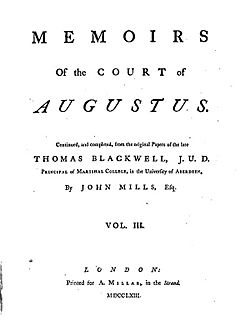Thomas Blackwell (scholar) facts for kids
Quick facts for kids
Thomas Blackwell
|
|
|---|---|
| Born | 4 August 1701 |
| Died | 6 March 1757 (aged 55) |
| Nationality | Scottish |
| Alma mater | Marischal College, University of Aberdeen |
| Spouse(s) | Barbara Black |
| Relatives | Thomas Blackwell (father), Christian Johnston (mother), Alexander Blackwell (brother) |
| Scientific career | |
| Institutions | Marischal College |
| Influences | Shaftesbury |
| Influenced | Herder |
Thomas Blackwell (born August 4, 1701 – died March 6, 1757) was a smart thinker and historian. He was also a big part of the Scottish Enlightenment, a time when many new ideas about science, philosophy, and society came out of Scotland. He was known for his studies of ancient Greek and Roman times.
Contents
Life Story
Thomas Blackwell was born in Aberdeen, Scotland, on August 4, 1701. His father, also named Thomas Blackwell, was a minister and later the head of Marischal College. His mother was Christian Johnston.
Thomas went to the Grammar School in Aberdeen. He then studied Greek and philosophy at Marischal College, which is now part of the University of Aberdeen. He earned his degree in 1718.
In 1723, he became a professor of Greek at Marischal College. Later, in 1748, he became the Principal (head) of the college. Blackwell was a very respected teacher. He taught many important people who became famous thinkers during the Scottish Enlightenment. Some of his students included George Campbell and James Beattie. He also had a strong influence on writers like James Macpherson and Adam Ferguson.
In 1751, Thomas Blackwell married Barbara Black. They did not have their own children. However, they helped raise Barbara's brother, Alexander Fordyce. Thomas Blackwell passed away in Edinburgh on March 6, 1757, after an illness. He was buried in Greyfriars Churchyard.
His Main Books
Blackwell wrote several important books. These books helped make him a leading figure in the Scottish Enlightenment. His most famous works include:
- An Enquiry into the Life and Writings of Homer (published in 1735)
- Letters Concerning Mythology (published in 1748)
- Memoirs of the Court of Augustus (published in three parts from 1753 to 1763)
About Enquiry into Homer
In his book Enquiry, Blackwell explored why Homer was such a great epic poet. He believed Homer's greatness came from his natural surroundings and the society he lived in. Blackwell thought that culture was something people learned and that it changed over time. This idea was very new and became important in understanding how human societies develop.
Blackwell also suggested that civilization, while bringing new things, could also make things less natural. He thought Homer was special because he lived at a time when old heroic stories were still strong. He believed Homer was an oral poet, meaning he sang his stories, and they were written down much later.
Many people at the time admired Enquiry. Famous historian Edward Gibbon called it "an effort of genius." This book helped bring back interest in studying Greek literature in Scotland.
About Letters Concerning Mythology
Letters Concerning Mythology was first published in 1748. Blackwell wrote most of the letters in this book. He had very original ideas about ancient myths.
For a long time, people had seen classical myths in different ways. Some thought they were just made-up history. Others, especially Christians, saw the ancient gods as evil spirits. Modern thinkers often saw myths as illogical.
Blackwell had a different view. He believed mythology was important for understanding ancient cultures. He thought that if you looked at the stories carefully, you could find deep meanings. He believed that smart people in ancient times saw myths as symbols that explained how the world worked.
Blackwell studied many different sources, including Greek, Latin, Hebrew, and Arabic texts. He tried to find the original meaning of myths before they were changed over time. He even compared ancient Jewish ideas with other beliefs from the Near East. He showed how the idea of one God might have changed into the worship of many gods. Blackwell always stressed that the past made sense when you looked at it from the viewpoint of the people who lived then.
About Memoirs of the Court of Augustus
In Memoirs of the Court of Augustus, Blackwell studied how people and society shaped each other. He looked at how Rome grew from a small village into a powerful empire. He noted that Rome started with a strong, military spirit and democratic rules.
However, he believed that Rome's government didn't have enough checks and balances. This meant it could easily fall into tyranny if the democratic spirit weakened. He thought a balanced government was key to long-lasting success. He also looked at other powerful nations like France and Spain.
Blackwell was fascinated by how power could change people's behavior. He studied famous Roman poets like Virgil and Horace. He showed how their art was influenced by politics and how it could also influence politics in return.
After Blackwell passed away, John Mills finished the third volume of Memoirs of the Court of Augustus. It was published in 1763.
His Lasting Impact
Thomas Blackwell's work was highly respected during his lifetime. For almost 50 years, he was seen as the most important scholar of Homer in Europe. However, his political views were not popular with some English critics, like Samuel Johnson. Because of this, his achievements were not always fully recognized for a long time.
See also
- Montesquieu
- Jean-Baptiste Dubos
- Johann Joachim Winckelmann
 | John T. Biggers |
 | Thomas Blackshear |
 | Mark Bradford |
 | Beverly Buchanan |


